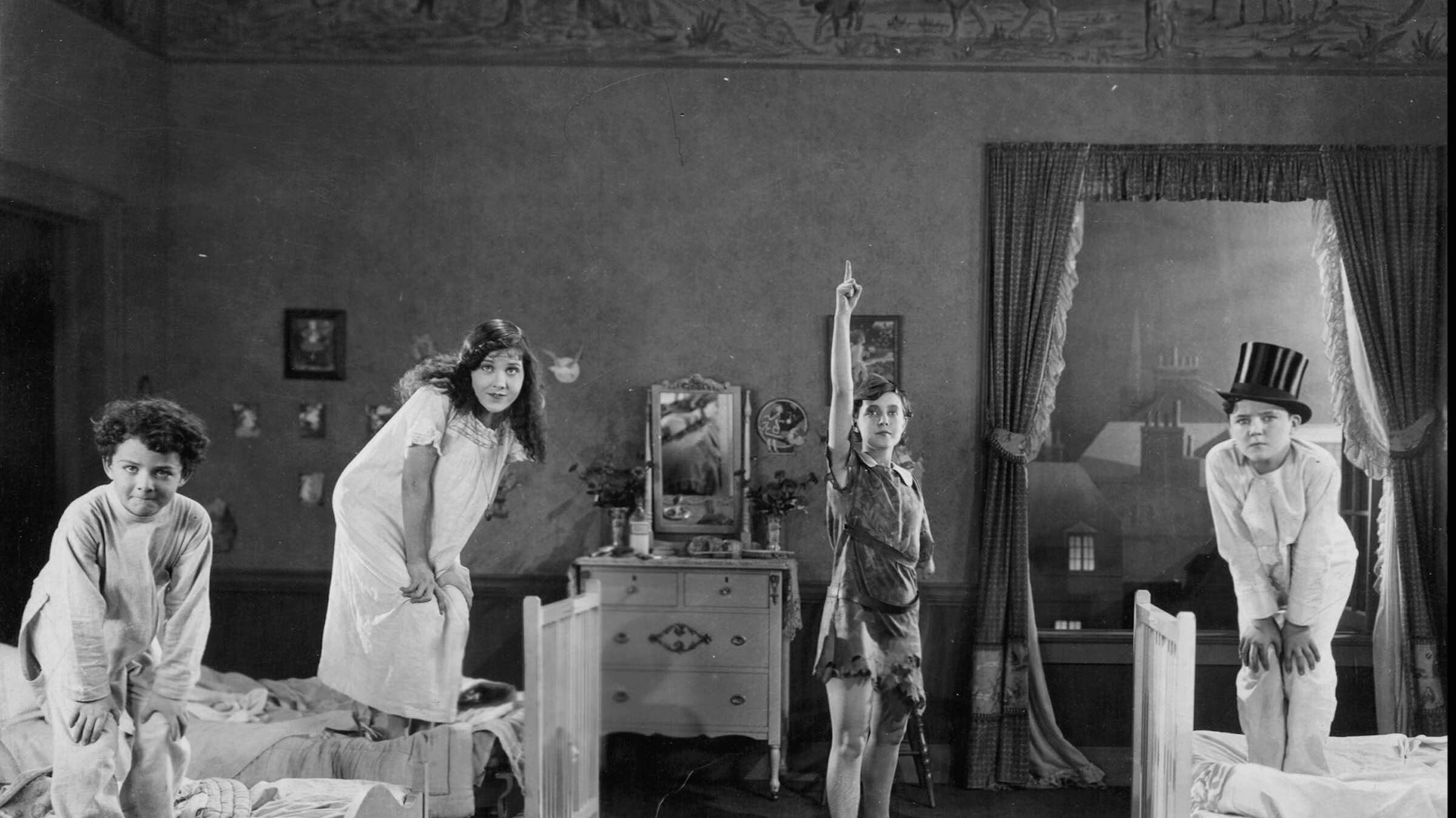Sir James Matthew Barrie wrote numerous books and plays, but he is best remembered for Peter Pan. Born in Kirriemuir, Scotland, on May 9, 1860, he began his writing career as a journalist, and, by the turn of the century he was a well-known playwright. Peter Pan, or The Boy Who Would Not Grow Up, premiered on the London stage on December 26, 1904, and was an instant success. Barrie had written the play for the Christmas pantomime, a traditional English entertainment that consisted of a fairy tale with elaborate special effects designed to wow the audience. The characters included fairies and other mythical creatures, and the principal character was generally a young boy played by a girl. The reason for this gender-switching was purely practical; girls were lighter in the harnesses that were required to lift them up into the air for the flying effects.
Movie studios recognized the potential of Peter Pan and pursued Barrie for 20 years before he finally sold the film rights to Jesse Lasky at Paramount. Barrie was enthusiastic about the possibilities film offered his play, and he wrote a new treatment that included scenes of a fairy wedding and a game of football in the treetops of Never Never Land. Director Herbert Brenon opted instead to follow the stage directions to the letter; almost all the intertitles are taken directly from the play.
George Ali, who played the Crocodile and Nana the Dog in the original stage production, reprised his roles for the film, and Tinker Bell was played alternately by a light on a fishing line and Virginia Brown Faire, “a dainty, delightful bit of femininity.” Barrie personally selected the 17-year-old Betty Bronson, who had only appeared in a few films as an extra, for the much-coveted role of Peter Pan. “I feel like a new Cinderella,” she telegraphed Barrie. Her expressive features, exuberant acting style and radiant childlike innocence contributed significantly to the film, and Peter Pan made her an overnight success. She went on to roles in A Kiss for Cinderella (1925), based on another play by Barrie, and Ben-Hur (1925), appearing in 33 films until her death in 1971.
Peter Pan fascinates as much today as it did in 1904 for the way it explores deeply meaningful ideas; there’s a lot going on beneath the surface of this seemingly simple children’s story. At the age of 60, Barrie himself admitted “It is as if long after writing Peter Pan its true meaning came to me: desperate attempt to grow up but can’t.” Whether he was familiar with the writings of Freud or not, there are definite parallels between the new psychology of Barrie’s day and Peter Pan. Wendy and Peter have a flirtatious relationship that incites Tinker Bell to jealousy, yet at the same time Peter Pan and the Lost Boys long for a mother, a role they eagerly assign to Wendy. Mr. Darling and Captain Hook were originally played by the same actor, establishing a classic Oedipal scenario that allows Peter Pan to do to Captain Hook what Freud claimed all small boys dream of doing to their fathers.
One particular incident from Barrie’s own life illuminates his closeness to Peter Pan. An older brother was accidentally killed when Barrie was still quite young, and the traumatic effect this incident had on his mother made a great impression on him. He determined to remain an eternally youthful substitute for his brother, both to console his mother and to assuage the jealousy he felt at the knowledge that he was not his mother’s favorite son. This tragedy was to affect him throughout his life; the last play he wrote before his death in 1937 was The Boy David—his brother’s name.
Despite its popularity, Peter Pan vanished from the public eye in 1929 when studios were destroying silent films by the thousands to make way for sound. In 1971, a 35mm nitrate color print of Peter Pan was discovered at the Eastman Theater in Rochester, New York. In 1995, a full restoration was made possible with funding from the Walt Disney Corporation, and the restored Peter Pan premiered at the Pordenone Film Festival in 1996. Complicated rights issues made public screenings impossible for several years, and it is only thanks to the perseverance of David Pierce that all legal problems have now been resolved, making it possible for Peter Pan to be seen by new generations of moviegoers.
Presented at SFSFF 2001 with live music by Flower City Society Orchestra, conducted by Philip Carli

